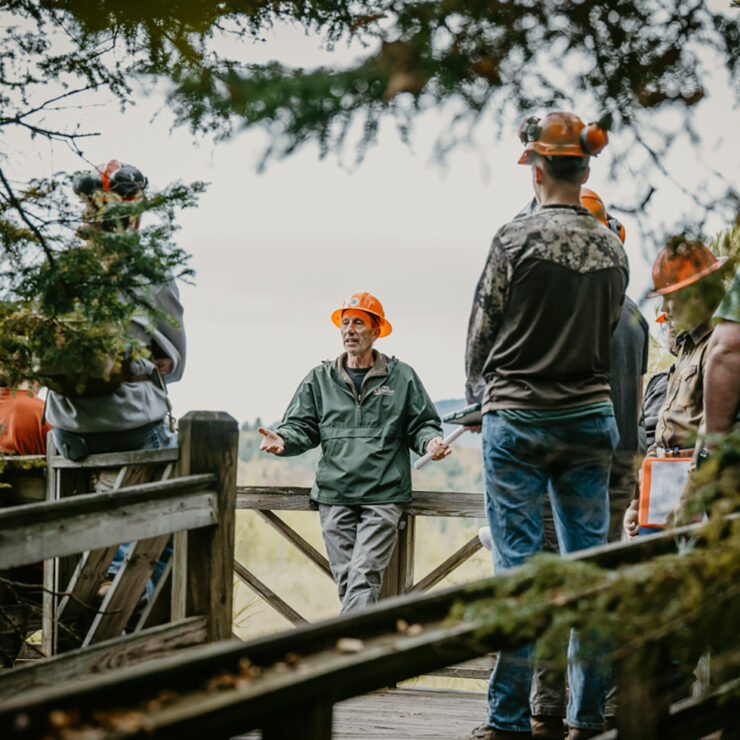Pair your major with a minor, and dive into whatever interests you.
At Paul Smith’s, our students have at least one thing in common: they want to make the most of their time here. Taking a new and interesting collection of courses is one way to stretch yourself and realize your full potential.
A minor allows you to focus on an interest area outside your major, and enables you to earn an additional credential that could come in handy as you pursue your career.
We’re here to help you decide on a minor that complements and bolsters your major field of study.
Minors for Every Interest
Which of these minors piques your interest? Where could your major and minor taken together open doors for you?
Minor Concentrations
The biology minor gives you the flexibility to choose courses that complement your major. Your options include lower division courses on the structure, functioning and interactions of living things, and upper division courses that deal with living things at different levels of organization. You could take courses on biological processes, organism diversity, and interactions between organisms and the environment.
Students will deepen their understanding about the structure, function, and ecology of the flora in the Adirondack Park.
Chemistry courses include laboratory skills that are not typically taught in other Paul Smith’s science courses. The lower division courses for this minor provide a foundation in both physical and organic chemistry. You’ll then choose one upper division chemistry course to gain specific expertise. The upper division chemistry courses each have a different focus, making them attractive to students from different disciplines.
Brewing craft beer has become all the rage in recent years, and with this minor, students can not only learn the process, but how to market and successfully sell products.
You find your field of interest, we’ll help you make a livelihood at it. Not only can you study forestry, culinary, hospitality, or sustainability, our entrepreneurship minor will give you the tools to create a career around your focus
Develop skills in communicating the critical and challenging issues involving the integrity of the natural world and the human practices, policies and traditions that affect it. The program serves the needs of students aiming at writing for the public about environmental challenges confronting our planet.
You’ll gain competence in reporting and science news writing, feature writing, and essay writing and storytelling. The program builds skill in the entire writing process, from topic generation to drafting, revision, editing and proofing.
You’ll identify and understand the origin of dominant environmental and social narratives, and the effect of these narratives on ecological and social-cultural resilience. The minor is intended to help young scholars develop the skills needed to create new bridge-building narratives useful in careers and community.
Learn how writers, artists, philosophers, and historians integrate the humanities, social sciences, and natural sciences into compelling expressions of the human condition that inspire change.
If you wish to gain an enriched understanding of critical environmental issues and their socio-cultural implications, the environmental studies minor may be right for you.
Forestry, natural resources, or recreation majors who want to take courses in the humanities and social sciences to supplement their technical degrees like the environmental studies minor.
An environmental studies minor also could be a valuable addition to a hospitality or culinary arts major interested in ecotourism, green management, or the environmental dimensions of the culinary sector.
Similarly, science and business majors could benefit from an environmental studies minor to provide critical cultural and historical context to their program studies.
Forestry is one of our signature programs. The forestry minor provides students in other programs the opportunity to get a basic education in forestry. Anyone seeking employment in the woods can broaden their training and learn about the multiple uses of forests through the forestry minor.
Geographic Information Systems (GIS) and related techniques for spatial data collection and analysis are increasingly important tools in forestry, recreation, natural resources, environmental science, and related disciplines. The GIS minor allows students currently enrolled in other programs to develop and demonstrate their skills in this important area.
Learn how to produce maple syrup through hands on learning, while also learning proper sugar bush management as well as marketing skills.
Sustainability is a common thread that runs through many of the programs at Paul Smith’s. The sustainable communities minor enables you to demonstrate a broad knowledge of natural resources sustainability. You’ll study the basics of ecological sustainability, society’s interaction with natural resources, conservation design of communities and structures, and alternative energy and land use planning.
Demand for wildland firefighters is expected to grow in response to more intense and frequent wildfires, particularly at the urban-wildland interface. The U.S. Forest Service spends over $1 billion annually with 47 million homes at “high risk” of loss from wildfire. The development of this minor is a direct response to this need, with entry-level firefighters earning about $40,000 during a six-month fire season.
Free Application
Future Smitties
After you apply, we'll connect you with an academic advisor to explore all your options.

